
Liberia is a country in West Africa founded by free people of color from the United States. The emigration of African Americans, both freeborn and recently emancipated, was funded and organized by the American Colonization Society (ACS). The mortality rate of these settlers was the highest among settlements reported with modern recordkeeping. Of the 4,571 emigrants who arrived in Liberia between 1820 and 1843, only 1,819 survived (39.8%).
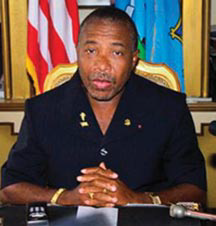
Charles McArthur Ghankay Taylor is a Liberian former politician and convicted war criminal who served as the 22nd president of Liberia from 2 August 1997 until his resignation on 11 August 2003 as a result of the Second Liberian Civil War and growing international pressure.

Foday Saybana Sankoh was the founder of the Sierra Leone rebel group Revolutionary United Front (RUF), which was supported by Charles Taylor-led NPFL in the 11-year-long Sierra Leone Civil War, starting in 1991 and ending in 2002. An estimated 50,000 people were killed during the war, and over 500,000 people were displaced in neighboring countries.
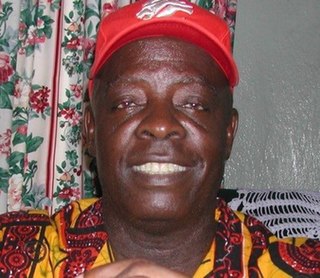
Moses Zeh Blah was a Liberian politician. He served as the 28th vice president of Liberia under President Charles Taylor and became the 23rd president of Liberia on 11 August 2003, following Taylor's resignation. He served as president for two months, until 14 October 2003, when a United Nations-backed transitional government, headed by Gyude Bryant, was established and Bryant was sworn in as Chairman of the Transitional Government of Liberia.
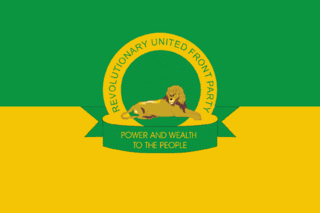
The Revolutionary United Front (RUF) was a rebel group that fought a failed eleven-year war in Sierra Leone, beginning in 1991 and ending in 2002. It later transformed into a political party, which still exists today. The three most senior surviving leaders, Issa Sesay, Morris Kallon and Augustine Gbao, were convicted in February 2009 of war crimes and crimes against humanity.

The First Liberian Civil War was the first of two civil wars within the West African nation of Liberia which lasted between 1989 and 1997. President Samuel Doe's regime of totalitarianism and widespread corruption led to calls for withdrawal of the support of the United States, by the late 1980s. The National Patriotic Front of Liberia (NPFL) led by Charles Taylor invaded Liberia from the Ivory Coast to overthrow Doe in December 1989 and gained control over most of the country within a year. Doe was captured and executed by the Independent National Patriotic Front of Liberia (INPFL), a splinter faction of the NPFL led by Prince Johnson, in September 1990. The NPFL and INPFL fought each other for control of the capital city, Monrovia and against the Armed Forces of Liberia and pro-Doe United Liberation Movement of Liberia for Democracy. Peace negotiations and foreign involvement led to a ceasefire in 1995 but fighting continued until a peace agreement between the main factions occurred in August 1996. Taylor was elected President of Liberia following the 1997 Liberian general election and entered office in August of the same year.
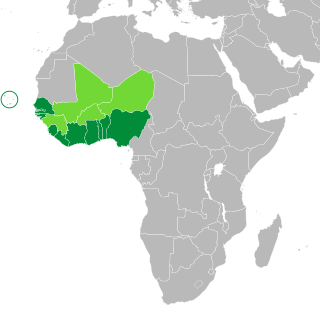
The Economic Community of West African States Monitoring Group (ECOMOG) was a West African multilateral armed force established by the Economic Community of West African States (ECOWAS). ECOMOG was a formal arrangement for separate armies to work together. It was largely supported by personnel and resources of the Nigerian Armed Forces, with sub-battalion strength units contributed by other ECOWAS members — Ghana, Guinea, Sierra Leone, The Gambia, Liberia, Mali, Burkina Faso, Niger, and others.
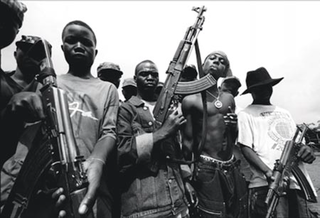
The Second Liberian Civil War was a civil war in the West African nation of Liberia that lasted from 1999 to 2003.
The Sierra Leone Civil War (1991–2002), or the Sierra Leonean Civil War, was a civil war in Sierra Leone that began on 23 March 1991 when the Revolutionary United Front (RUF), with support from the special forces of Liberian dictator Charles Taylor's National Patriotic Front of Liberia (NPFL), intervened in Sierra Leone in an attempt to overthrow the Joseph Momoh government. The resulting civil war lasted almost 11 years, and had over 50,000, up to 70,000, casualties in total; an estimated 2.5 million people were displaced during the conflict.
The National Patriotic Front of Liberia (NPFL) was a Liberian rebel group that initiated and participated in the First Liberian Civil War from 24 December 1989 – 2 August 1997. The NPFL emerged out of rising ethnic tensions and civil unrest due to the Liberian government that was characterized by totalitarianism, corruption, and favoritism towards ethnic Krahns. The NPFL invaded Liberia through Ivory Coast’s border with Nimba County in Liberia under the direction of Charles Taylor, a former Liberian politician and guerrilla leader who served as the 22nd president of Liberia from 2 August 1997 until his resignation on 11 August 2003.
Samuel Sam Bockarie, widely known as Mosquito, was a Sierra Leonean politician and army commander who served as a leader of the Revolutionary United Front (RUF). Bockarie was infamous during the Sierra Leone Civil War for his brutal tactics, which included amputation, mutilation, and rape. He earned the nickname "Mosquito" for his ability to attack when his enemies were off-guard, mainly during the night. During his service in the RUF, he befriended future Liberian president Charles Taylor, and RUF commander Foday Sankoh. When Sankoh was imprisoned from March 1997 until April 1999, Bockarie served as commander of the RUF in his place.
Henry Boimah Fahnbulleh, Jr. is a Liberian politician and diplomat. He most recently served in the Liberian Government as National Security Advisor in the Ellen Johnson Sirleaf administration. Immediately previous to his appointment as National Security Advisor, he served as Advisor on International Affairs in the same government. He served as Foreign Minister from 1981 to 1983 under President Samuel Doe.
A new civil war began in 1999 when a rebel group backed by the government of neighboring Guinea, the Liberians United for Reconciliation and Democracy (LURD), emerged in northern Liberia. By the spring of 2001, they were posing a major threat to the Taylor government. Liberia was now engaged in a complex three-way conflict with Sierra Leone and the Guinea Republic. By the beginning of 2002, both of these countries were supporting the latest addition to the lexicon of Liberian guerrilla outfits – Liberians United for Reconciliation and Democracy (LURD), while Taylor was supporting various opposition factions in both countries. By supporting Sierra Leonean rebels, Taylor also drew the enmity of the British and Americans.
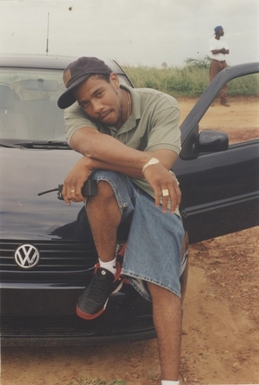
Charles McArther Emmanuel, also known as Chuckie Taylor, is the son of Charles Taylor, the former President of Liberia.
The Small Boys Unit (SBU) was a group of children who were forcibly recruited by the Revolutionary United Front (RUF) as militants during the Sierra Leone Civil War. The war began in 1991, when the RUF desired to overthrow the government and gain control of the diamond mines, a major source of revenue for the country. In 1998, 25% of the soldiers fighting in the war were under 18, and of those, 50% were abducted and 28% were under the age of 12. The war ended with a ceasefire on 18 January 2002.
The Press Union of Liberia was founded on September 30, 1964, by a group of independent journalists. It serves as an umbrella organization for media professionals and institutions to advocate for press freedom and the legal protection of journalists.
Benjamin Yeaten, widely known by his old radio call sign "50", is a Liberian militia leader and mercenary, who served as the Armed Forces of Liberia's deputy commander and director of the Special Security Service (SSS) during the presidency of Charles Taylor. Notorious for committing several war crimes, Yeaten was one of Taylor's most trusted and loyal followers. He rose to the de facto leader of all of Taylor's armed forces and the second most powerful figure in the government during the Second Liberian Civil War. After the fall of Taylor's regime, he managed to flee his home country, and since then operates covertly in West Africa as commander, recruiter, and military adviser for hire.
Hassan Bility is a Liberian journalist, and the founder and Director of the Global Justice and Research Project (GJRP), a non-governmental organization dedicated to the documentation of war time atrocities in Liberia and to assisting victims in their pursuit of justice for these crimes.
Civitas Maxima is a non-governmental organisation that documents mass crimes, such as crimes against humanity, genocide, and war crimes, and pursues justice on behalf of the victims, particularly in West Africa.










